人教版七年级下册英语Unit 11 How was your school trip第四课时教学课件
人教版七年级英语下册Unit11Howwasyourschooltrip单元复习
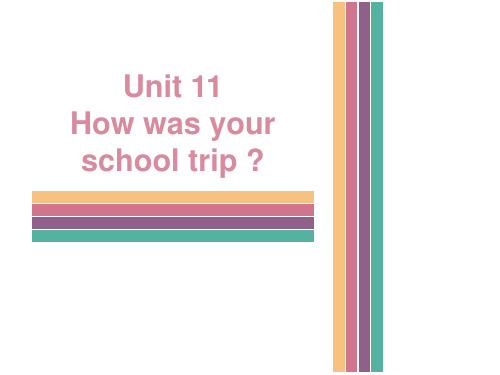
2.__ta_k_e_____ 4.__h_a_d_____ 6._r_o_d_e_____ 8.__b_u_t_____ 10.__a_______
基础复现天天练 Work seriously
●难点释疑 ①go on a school trip意为“参加学校郊 游”。如: All the students went on a school trip last week. 上周所有学生都参加学校郊游活动。 ②worry是动词,意为“担心”。常见一般 搭配为 worry about。如: You don’t need to worry about me.
目录 contents
4 主要语法
主要语法
Work seriously
四、主要语法 用一般过去时询问或描述过去事 件及关感受
★询问对过去事件的感受: 1.—How was your school trip? —It was great. ——你的学校旅行怎么样?——很好。 2.—Were the strawberries good ? —Yes, they were. ——草莓好吃吗?——是的,好吃。
Life on the farm was so much 8 .We went fishing in the early morning, went 9 a walk after
基础复现天天练 Work seriously
supper and watched the 10 at night when the weather was fine.They were very beautiful.
Have 10 nice day! Write to me if you can.
Yours, Lily
人教版七年级下册 Unit 11 How was your school trip 知识点(适合于听写 学生对照背诵)-带答案

人教版七年级下册Unit 11 How was your school trip 知识点1.把...喂给...用...喂养...以...为食...2.一个能干的农夫正在他的大农场耕作。
3.在农场周围散步4.许多/ 许许多多的5.我有很多事情要告诉你。
6.相当漂亮的一个女孩(quite / very )7.你知道关于他的一些事吗?8.带领某人参观某地9.show up / show off / on show10.看见一些有趣的事情11.从某人哪里学到很多关于12.名词前有哪些词时,无介词13.一名优秀的运动员在...方面优秀14.幸运的是,我们及时上了汽车。
15.一般过去时的标志词16.蛮好玩17.你说的太多了18.so many 和so much的区别19.很开心做某事20.担忧某事(worry)2种e out 的含义3种22.天气变得非常的晴朗。
23.长得很好/ 长大/种植水稻24.绘画/ 油画25.去旅行(2种)26.到...去旅行/ 去度假27.沿途/ 顺便问一下/ 以这种方式28.教我们如何制作机器人教某人如何做某事29.教某人某事30.我不知道去哪里/做什么/怎么做31.北京房子的价格很高。
32.总的来说33.让人兴奋的一天34.今天的学校旅行/五分钟的路程35.复合不定代词36.对...感兴趣/37.听到某人做某事/听到某人正在做某事38.不客气(all)39.作文构思40.你的学校旅行怎么样?41.去散步42.给奶牛挤奶43.骑马44.喂鸡45.与农民交谈46.拍一些照片47.带领Alice参观农场48.学习了很多关于农务49.从十二月到六月种植草莓50.摘一些草莓51.带他们回家52.你上周旅行怎么样?54.我去农村拜访我爷爷奶奶了。
55.你做什么了?56.我晚上观看星星了。
57.你真幸运。
58.你去动物园了吗?不,我没有。
我去了农场。
59.你看到一些牛了吗?是的,看到了。
我看到了很多。
人教七下Unit 11 How was your school trip?知识点

Unit 11 How was your school trip?Section A1. How was your trip yesterday?(1)本句为询问某事情况的常用句型,其中was是be动词的过去式,如果询问当前的情况则be动词用is。
其答语常用:It was great! (好极了) / It was OK.(还可以)/ It wasn’t good.(不好。
)/ All right.(很好。
)/ It was not bad.(还不错。
)等。
How + be+…?相当于What + be +… + like? 例如:-How was her holiday?-It was not bad.(2)How是疑问副词,意为“如何,怎样”,常用来引导特殊疑问句来询问方式、程度、状况等。
常用于以下交际用语中:1)How is/are +sb. ? 用来询问人的身体、工作、学习或生活等的状况。
例如:-How are you? -Fine, thank you.2)How is/are +sth.?用来询问某物或者某事的状况如何。
例如:How is your work?3)How do you do? 并不表示疑问,是第一次见面时的问候语,回答仍用此句。
例如:How do you do? ---How do you do?4)How is it going?/ How is everything going? 用来询问事情进展如何。
例如:How is it going? Very well./ Not too bad./just so so.2. feed chickenfeed 作及物动词,意为“喂养,饲养”,其后常接表示动物名称的词作宾语。
例如:My father’s job is to feed the animals.拓展:(1)feed..to…意为“把……喂给……吃”。
feed后接饲料或者食物名称做宾语,to为介词,其后一般接动物或者小孩等名词表示对象。
人教版英语七年级下册Unit_11_How__was_your_school_trip_?_Section__B
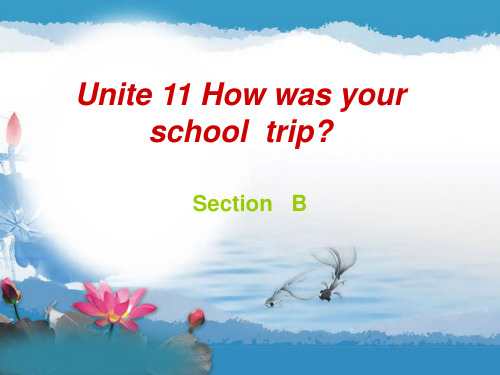
2c Complete the chart. How do Helen and
Jim describe these things?
Helen the trip the train Jim
1c Listen again. What did Jane and Tony
do on their last school trip? Check (√) Tony or Jane.
went to the countryside climbed went to saw some drew a an art paintings pictures mountain museum
watch flowers
watched flowers
pick strawberries picked strawberries
1a Match the activities with the pictures 1.go to the zoo __ 4. climb a mountain__ 2.visit a museum__ 5. visit a fire station__ 3.ride a horse__ 6.go fishing__
e
a
d
b
f
c
1a Match the activities with the pictures 1.go to the zoo _a_ 4. climb a mountain_e_ 2.visit a museum_c_ 5. visit a fire station_d_ 3.ride a horse_b_ 6.go fishing_f_
II. 译出下列短语 去散步 去购物 去钓鱼 挤奶牛 骑马 骑自行车 喂小鸡 和某人谈话 拍照
2024年人教版七年级英语下册教案Unit11 How was your school第2课时

第二课时Section A(Grammar Focus—3b)教学目标通过本课的学习,学生能够:1.掌握动词过去式的变化规律。
(获取信息)2.感知一般现在时和一般过去时的区别,使用一般过去时描述过去发生的事情。
(内化应用)3.借助小组活动,合作探究Jim和Bill的两封信,体会一般过去时在生活中的应用。
(迁移创新)语篇研读What:本课时是语法课,Grammar Focus梳理了一般过去时的用法,包括谓语动词分别为be动词和实义动词的一般过去时的陈述句、一般疑问句及其回答;还展示了部分规则动词和不规则动词的过去式形式。
3a提供了两封信,3b则以游戏的形式让学生运用目标语言,学生发挥自己的想象力,使语法学习充满趣味性。
Why:通过完成Jim和Bill的两封信,学生关注语言形式在特定语境中的意义,能有效加强学生实际运用动词过去式的能力。
How:语篇采用书信形式谈论周末活动,要求学生根据信件内容用括号内动词的形式填空,巩固一般过去时的用法。
教学过程设计理念:以《英语课程标准》核心素养为导向,以单元主题为引领,基于语篇的育人理念,体现《英语课程标准》“学思用创”的英语学习活动观和“教—学—评”一体化设计理念。
续表续表教学目标学生活动效果评价Activity5: Complete3a通过语篇练习,在语篇语境中掌握目标语法1.Work on3a—Complete Jim’s letteron the left and Bill’s reply on theright.2.Read the two letters.3.Explain the usages of some points.观察学生能否完成练习任务,教师根据学生情况给出必要的指导和反馈。
设计意图通过两封信的动词填空练习,让学生进一步感知一般过去时,并巩固其用法【应用实践】Activity6: Complete3b通过故事接龙的活动,发散思维,并培养学生的默契Work in a group.1.Make up a story.Each student adds asentence.A:Last week I visited my aunt’shouse.B:The weather was beautiful.C:We went fishing.D:…2.Show their stories.小组活动过程中,教师在全班巡视,并给予必要的帮助设计意图通过小组活动,进一步感受一般过去时,巩固对语法的掌握板书设计作业设计基础型作业:Write down the sentences of Grammar Focus.实践型作业:Read3a.拓展型作业:Enjoy the beautiful article on the learning paper.教学反思。
人教版七年级下英语Unit 11 How was your school trip单元知识复习总结

Unit 11How was your school trip?重点词汇重点短语Section A 1.milk a cow给奶牛挤奶2.ride a horse骑马3.feed chickens喂鸡4.quite a lot (of...)许多……5.in the countryside在乡下;在农村6.go for a walk去散步7.talk with a farmer 与一位农民交谈8.take some photos拍一些照片9.grow apples种苹果10.show sb.around带某人参观11.learn a lot about...学习许多关于……12.pick some strawberries采摘一些草莓13.last week上周14.go fishing去钓鱼15.so much fun如此多的乐趣16.at night在夜晚17.school trip学校旅行18.climb the mountains爬山19.come out 出现Section B 20.fire station消防站21.all in all总的说来22.be interested in对……感兴趣23.go to the zoo去动物园24.visit a museum参观博物馆25.climb a mountain爬山26.buy sth.for sb.为某人买某物27.not...at all一点儿也不28.along the way沿途,一路上29.teach sb.how to do sth.教导某人如何做某事30.slow train慢火车31.gift shop礼品商店32.an exciting day令人兴奋的一天33.at the museum在博物馆34.draw pictures画画35.see some painting看见一些画重点句型1.How was your school trip?/What was your school trip like?你(们)的学校郊游怎么样?2.The farmer showed Carol around the farm.这位农民带着卡萝尔参观了农场。
2023年人教版七年级英语下册《Unit 11 How was your school trip》句
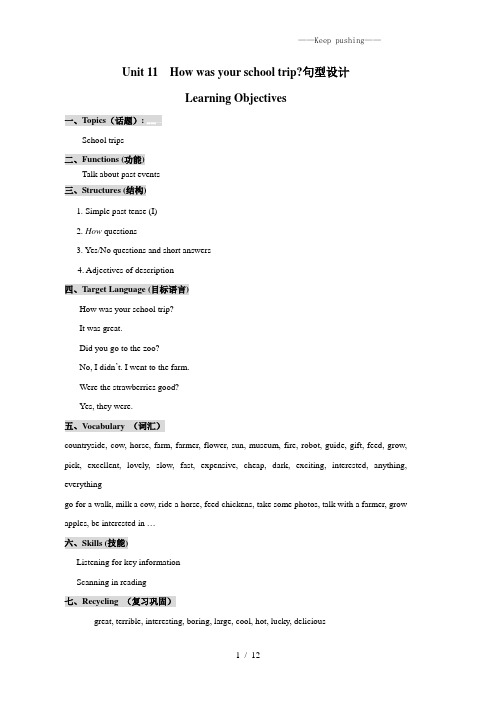
Unit 11 How was your school trip?句型设计Learning Objectives一、Topics(话题):School trips二、Functions (功能)Talk about past events三、Structures (结构)1. Simple past tense (I)2. How questions3. Yes/No questions and short answers4. Adjectives of description四、Target Language (目标语言)How was your school trip?It was great.Did you go to the zoo?No, I didn’t. I went to the farm.Were the strawberries good?Yes, they were.五、Vocabulary (词汇)countryside, cow, horse, farm, farmer, flower, sun, museum, fire, robot, guide, gift, feed, grow, pick, excellent, lovely, slow, fast, expensive, cheap, dark, exciting, interested, anything, everythinggo for a walk, milk a cow, ride a horse, feed chickens, take some photos, talk with a farmer, grow apples, be interested in …六、Skills (技能)Listening for key informationScanning in reading七、Recycling (复习巩固)great, terrible, interesting, boring, large, cool, hot, lucky, delicious八、教材分析本单元的话题是谈论学校郊游,要求学生学会使用一般过去式讲述过去发生的事情,学会用一般过去时写日记。
2020年人教版七年级英语下册Unit11 How was your school trip 要点详解
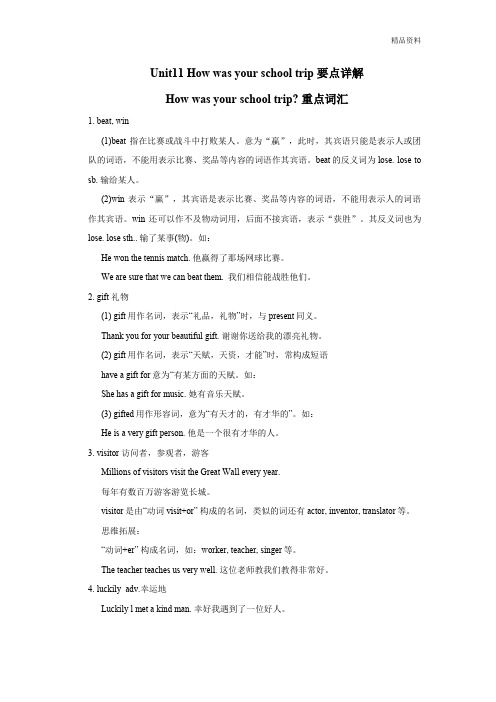
Unit11 How was your school trip 要点详解How was your school trip? 重点词汇1. beat, win(1)beat指在比赛或战斗中打败某人。
意为“蠃”,此时,其宾语只能是表示人或团队的词语,不能用表示比赛、奖品等内容的词语作其宾语。
beat的反义词为lose. lose to sb. 输给某人。
(2)win表示“赢”,其宾语是表示比赛、奖品等内容的词语,不能用表示人的词语作其宾语。
win还可以作不及物动词用,后面不接宾语,表示“获胜”。
其反义词也为lose. lose sth.. 输了某事(物)。
如:He won the tennis match. 他赢得了那场网球比赛。
We are sure that we can beat them. 我们相信能战胜他们。
2. gift 礼物(1) gift用作名词,表示“礼品,礼物”时,与present同义。
Thank you for your beautiful gift. 谢谢你送给我的漂亮礼物。
(2) gift用作名词,表示“天赋,天资,才能”时,常构成短语have a gift for意为“有某方面的天赋。
如:She has a gift for music. 她有音乐天赋。
(3) gifted用作形容词,意为“有天才的,有才华的”。
如:He is a very gift person. 他是一个很有才华的人。
3. visitor 访问者,参观者,游客Millions of visitors visit the Great Wall every year.每年有数百万游客游览长城。
visitor是由“动词visit+or”构成的名词,类似的词还有actor, inventor, translator等。
思维拓展:“动词+er”构成名词,如:worker, teacher, singer等。
The teacher teaches us very well. 这位老师教我们教得非常好。
2020年人教版新目标七下Unit 11 How was your school trip 单词和课
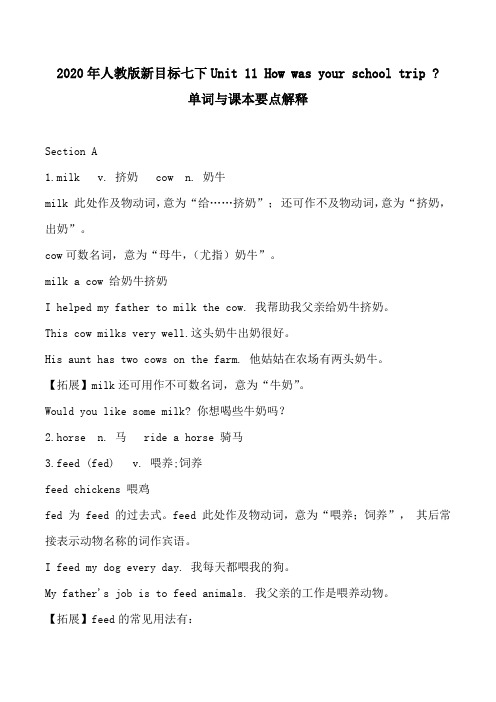
2020年人教版新目标七下Unit 11 How was your school trip ?单词与课本要点解释Section Ak v. 挤奶 cow n. 奶牛milk 此处作及物动词,意为“给……挤奶”;还可作不及物动词,意为“挤奶,出奶”。
cow可数名词,意为“母牛,(尤指)奶牛”。
milk a cow 给奶牛挤奶I helped my father to milk the cow. 我帮助我父亲给奶牛挤奶。
This cow milks very well.这头奶牛出奶很好。
His aunt has two cows on the farm. 他姑姑在农场有两头奶牛。
【拓展】milk还可用作不可数名词,意为“牛奶”。
Would you like some milk? 你想喝些牛奶吗?2.horse n. 马 ride a horse 骑马3.feed (fed) v. 喂养;饲养feed chickens 喂鸡fed 为 feed 的过去式。
feed 此处作及物动词,意为“喂养;饲养”,其后常接表示动物名称的词作宾语。
I feed my dog every day. 我每天都喂我的狗。
My father's job is to feed animals. 我父亲的工作是喂养动物。
【拓展】feed的常见用法有:①feed sth.to sb. /sth. 把某物喂给某人/某物Please feed some grass to the cow. 请给这头奶牛喂些草。
She fed milk to the baby. 她给婴儿喂了牛奶。
②feed on 以……为生,以……为食Sheep feed on grass. 绵羊以草为食。
③feed…on/with…用……喂……He feeds the dog on meat. 他用肉喂狗。
4.farmer n. 农民;农场主farm名词,意为“农场”;动词意为“耕种;干农活”。
人教版七年级下册英语Unit11
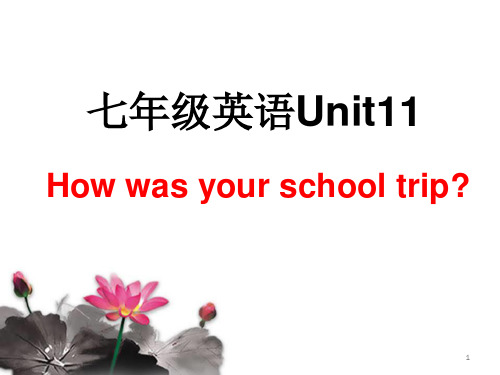
ቤተ መጻሕፍቲ ባይዱ
精讲知识点
知识点1:一般过去时的用法 表示_过__去__某个时间发生的_动__作__ 或_存__在__的__状__态_,常
和表示过去的__时__间___状__语____连用. 标志词:y_e_s__te_r_d__a_y_, _la__s_t n__ig__h_t__, t_w__o__d_a_y__s__a_g_o
man , and then he showed us _C____ his old house
happily.
A. to ; to
B. with ; around
C . to ; around D . with ; to
解析:show sth. to sb. 给某人看… Show sb. around … 领某人参观… 7
箱)。
A. tomatos ; milk B. tomatos ; milks
C. tomatoes ; milk D. tomatoes ; milks 5
知识点二 短语 1
1去散步 go__f_o_r_a__w__a_l_k______ 2给奶牛挤牛奶__m__i_l_k__a___c_o_w___ 3骑马___r_i_d_e__a__h_o__rs__e__________ 4喂鸡__f_e_e_d__c__h_i_c_k_e_n__s_________ 5与......谈话__t_a_l_k__w__i_th___s_b__. ___ 6拍照 _ta__k_e__p__h_o_t_o__s_________ 7相当多;许多___q__u_it_e__a__l_o_t___ 8带领......参观_s_h__o_w__.._.._._.a__ro__u_n__d 9了解 ____l_e_a_r_n__a__b_o_u__t_________
人教版pep英语七年级下册-Unit-11-单元分析

比分析能力。
品店的东西很贵。
分课时教学目标
课时 period 1
period 2
Period 3 Period 4
Period 5
分课时教学目标
学生能够: 1.了解卡罗尔在旅行中做了什么的详细信息,并复述卡罗尔的 旅行经历; 2.正确使用目标语言进行关于旅行的对话。
1.获得埃里克、简和托尼旅行的详细信息; 2.用目标语言复述和谈论这些旅行; 3.从更多方面分享我们自己的旅行,并思考我们可以从旅行中 得到什么。
作业设计 根据农场旅行vlog编写对话(学习理解+应 用实践) 描述自己的一段令人难忘的旅行经历(应 用实践+迁移创新)
利用静态雕像进行故事接龙(应用实践+迁 移创新)
按要求编写和Jim的对话(应用实践+迁移 创新)
写一篇旅行日记(应用实践)
教学内容 语篇类型
Period 4
2b两篇日记 (应用文)
What
Why
How
Helen和Jim的日记,记录了 2b两篇日记是两个人 因为是日记体裁,所以这两
对待同一场学校旅行两人不 对同一场学校旅行截 个语篇均使用第一人称和一
同的感受和评价。
然不同的记录与感受。 般过去时按照旅行发展的顺
Helen认为参观科学博物馆 启发学生对于看待事 序去展开描述,Helen与Jim
行很糟糕,觉得火车很慢车 写作。
lovely, exciting,
厢里面很热,博物馆大且无
terrible, hot, boring等
趣,因为他对机器人不感兴
形成的对比,这不仅考查了
趣。馆内很暗所以他没拍照。
学生对篇章的理解,培养了
而且人很多,他看不清也听
人教新目标版七年级英语下册中考考纲词汇详解: Unit 11 How was your school trip
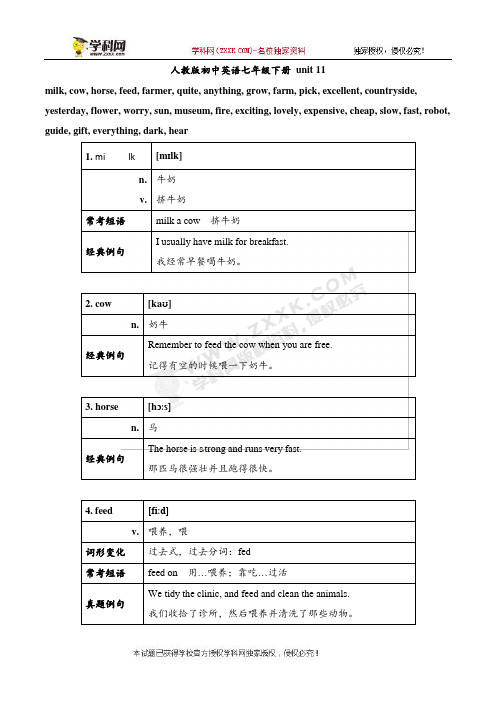
人教版初中英语七年级下册unit 11milk, cow, horse, feed, farmer, quite, anything, grow, farm, pick, excellent, countryside, yesterday, flower, worry, sun, museum, fire, exciting, lovely, expensive, cheap, slow, fast, robot, guide, gift, everything, dark, hear1. mi lk[mɪlk]n. v. 牛奶挤牛奶常考短语milk a cow 挤牛奶经典例句I usually have milk for breakfast.我经常早餐喝牛奶。
2. cow [kaʊ]n. 奶牛经典例句Remember to feed the cow when you are free.记得有空的时候喂一下奶牛。
3. horse [hɔːs]n. 马经典例句The horse is s trong and runs very fast.那匹马很强壮并且跑得很快。
4.feed [fiːd]v. 喂养,喂词形变化过去式,过去分词:fed常考短语feed on 用…喂养;靠吃…过活真题例句We tidy the clinic, and feed and clean the animals.我们收拾了诊所,然后喂养并清洗了那些动物。
5.farmer ['fɑːmə(r)]n. 农夫;农场主词形变化farm n.农场真题例句People should be grateful to a kindhearted farmer named Dan West.人们应该要对一个叫做丹﹒威斯特的好心农民心存感激。
6. quite [kwaɪt]adv. 相当,很常考短语quite a few 相当多真题例句Tom, a twelve – year – old boy, can speak English quite well.汤姆,一个12岁的男孩,能说英语说得很好。
人教七年级英语下《Unit11HowwasyourschooltripPeriod4》
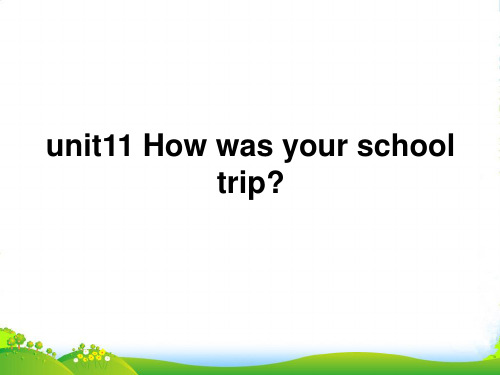
5. My father often
(swim)in this river when he was
young.
答案: 1. was 2. Were 3. visited 4. rode 5. swam
Ⅱ. 句型转换
1. She was a dancer 10 years ago. (改为否定句)
She
的消息时, 每个人激动不已。excited人感到兴奋, 修饰人;
exciting令人兴奋的, 指物体令人兴奋, 修饰物, 故选B。
【习作在线】 四练笔巩固--1师友练笔
请根据下表提示, 以“A Great School Trip”为题写一篇
英语短文, 介绍七年级一班去泰山(Mount Tai)校游的情况。
3. 昨天他参加了学校旅游。
He
a school trip yesterday.
4. 母亲教我如何做早饭。
My mother
me
cook breakfast.
5. 他一点也不喜欢这次旅行。
He
like the trip
.
答案: 3. went on 4. taught; how to 5. didn’t; at all
19. along the way 沿线
20. after that 之后 21. buy sth. for sb. 为某人买某物
22. all in all 总的来说 23. take a / the train 乘火车
一、知识回顾 ---2. 教师点评
【语法总结】一般过去时 (一)一般过去时的定义 一般过去时表示过去某个时间发生的动作或存在
→
(adv. )幸运地; 好运地
7. paint(v. )
人教版七年级英语下册 Unit11How was your school trip_重点知识点
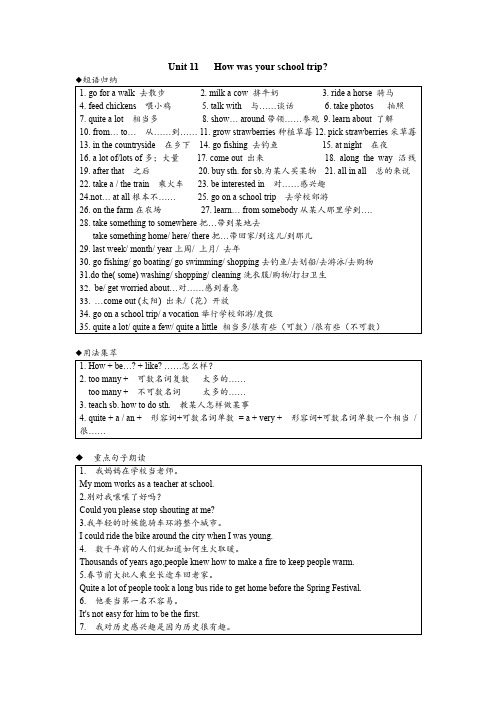
18.乘火车我们很快就到了那儿。
We got there so fast by train.
19.沿途我们看见了些农场和村庄。
We saw some farms and villages along the way.
20.我不知道它们还有本事和我们下棋。
◆用法集萃
1. How + be…? + like? ……怎么样?
2. too many +可数名词复数太多的……
too many +不可数名词太多的……
3. teach sb. how to do sth.教某人怎样做某事
4. quite + a / an +形容词+可数名词单数= a + very +形容词+可数名词单数一个相当/很……
4.数千年前的人们就知道如何生火取暖。
Thousands of years ago,people knew how to make a fire to keep people warm.
5.春节前大批人乘坐长途车回老家。
Quite a lot of people took a long bus ride to get home before the Spring Festival.
22. take a / the train乘火车23. be interested in对……感兴趣
24.not… at all根本不……25. go on a school trip去学校郊游
26.on the farm在农场27. learn… from somebody从某人那里学到….
28. take something to somewhere把…带到某地去
人教版七年级下册Unit11知识点梳理+习题
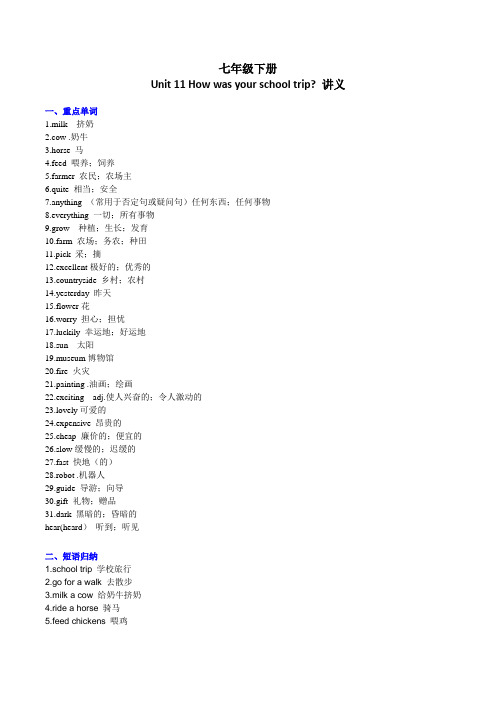
七年级下册Unit 11 How was your school trip? 讲义一、重点单词k 挤奶2.cow .奶牛3.horse 马4.feed 喂养;饲养5.farmer 农民;农场主6.quite 相当;安全7.anything (常用于否定句或疑问句)任何东西;任何事物8.everything 一切;所有事物9.grow 种植;生长;发育10.farm 农场;务农;种田11.pick 采;摘12.excellent极好的;优秀的13.countryside 乡村;农村14.yesterday 昨天15.flower花16.worry 担心;担忧17.luckily 幸运地;好运地18.sun 太阳19.museum博物馆20.fire 火灾21.painting .油画;绘画22.exciting adj.使人兴奋的;令人激动的23.lovely可爱的24.expensive 昂贵的25.cheap 廉价的;便宜的26.slow缓慢的;迟缓的27.fast 快地(的)28.robot .机器人29.guide 导游;向导30.gift 礼物;赠品31.dark 黑暗的;昏暗的hear(heard)听到;听见二、短语归纳1.school trip 学校旅行2.go for a walk 去散步k a cow 给奶牛挤奶4.ride a horse 骑马5.feed chickens 喂鸡6.talk with 和......交谈7.take photos /a photo拍照st week上周9.ask some questions问一些问题10.quite a lot 相当多11.show sb. around sp.带某人参观某地12.learn about 了解13.grow strawberries种植草莓14.from...to... 从…到…15.pick some strawberries摘草莓16.take sth home带…回家17.climb the mountains 爬山18.visit my grandparents看望我的祖父母19.go fishing 去钓鱼20.so much 如此多的21.go to the zoo去动物园22.go to a farm去农场23a lot of fun很多乐趣24.play games 做游戏e out 出来26.go to the countryside去乡下27.science museum科学博物馆28.visit a museum 参观博物馆29.play chess with sb... 和…下棋30.buy sth for sb为某人买31.be interested in…对…感兴趣32.all in all总的来说33.not...at all 一点也不,根本不三、词汇、句型讲解及拓展1. How was your school trip? 学校旅行怎么样?【解析】How + be + 主语?= What be +主语 + like?意为“….怎么样?”★★★本句的答语:It was great./It was OK./It was /wasn’t good….【拓展】how是疑问副词,意为“怎么样,怎么”,用来构成特殊疑问句,主要用法如下:1)询问如何做某事,或者做某事方式。
- 1、下载文档前请自行甄别文档内容的完整性,平台不提供额外的编辑、内容补充、找答案等附加服务。
- 2、"仅部分预览"的文档,不可在线预览部分如存在完整性等问题,可反馈申请退款(可完整预览的文档不适用该条件!)。
- 3、如文档侵犯您的权益,请联系客服反馈,我们会尽快为您处理(人工客服工作时间:9:00-18:30)。
science museum
June 15th Today I went on a school trip. We visited the science museum and it was really interesting. WWe saw farms and villages along the way At the museum, I learned a lot about robots. I didn’t know they could play chess with us. It was so cool! Then the guide taught us how to make a model robot. I took a lot of great
2. Everything was about robots and I’m not interested in that. 每个东西都是关于机器人的,我对此 不感兴趣。 be interested in 对„„感兴趣 例如: We are interested in English. 我们对英语感兴趣。
辨析:interested/interesting interested / interesting 二者均为形容词, interested 用于“be (become) interested in的结构中,表达的是某人对某事或某物 是感兴趣的; 而 interesting 则指某事或某物本身具有 使人感兴趣的特性,即某事(物)本身是 “有趣的;有意思的”,在句中既可作定 语,也可作表语。
____ √ interesting ____ √ lovely ____ × difficult ____ × slow ____ √ exciting ____ √ lucky ____ √ delicious ____ √ cool × boring ____ ____ √ great ____ hot ____ √ large ____ × expensive ____ × terrible ____ cheap ____ fast
辨析:interested/interesting
I am interested in collecting stamps. 我对收集邮票很感兴趣。 That is an interesting book,you must read it. 那是一本很有意思的书,你一定要读读。
Complete the chart. How do Helen and Jim describe these things? Helen the trip the train the museum the gift shop and gifts Jim
exciting fast cool
not expensive
photos, too. After that, I went to the gift shop and bought some lovely gifts for my parents. They weren’t expensive. All in all, it was an exciting day.
June 15th I think today’s school trip was terrible. We took the train to the museum. It was so hot on the slow train. The museum was big and boring. Everything was about robots and I’m not interested in that. The rooms were really dark and it was difficult to take photos, so l didn’t take any. There were also too many people and I couldn’t really see or hear the guide. The things in the gift shop were so expensive. I didn’t like the trip at all.
2b
Read Helen’s and Jim’s diary entries and answer the questions.
1.Did Helen and Jim go on the same trip?
Yes, Helen and Jim went on the same trip. 2. How do they feel about the trip? Helen thought the trip was great, but Jim didn’t like the trip at all.
terrible hot and slow big and boring so expensive
1. All in all, it was an exciting day. 总之,这是令人兴奋的一天。 all in all 相当于汉语中的“总的说来;总之; 整体上说”,用来对所阐述的内容进行概括性总 结及归纳。例如: All in all, I think you did a good job. 总的说来,我认为你干得很好。
Unit 11 How was your school trip?
Section B (2a-2c)
Lead-in Have you ever gone to a science museum?
How was the trip?
What did you see?
课文展现
Do the following words describe good 2a things or bad things? Put a√ for good and an ×for bad. Leave a blank if they can mean both.
